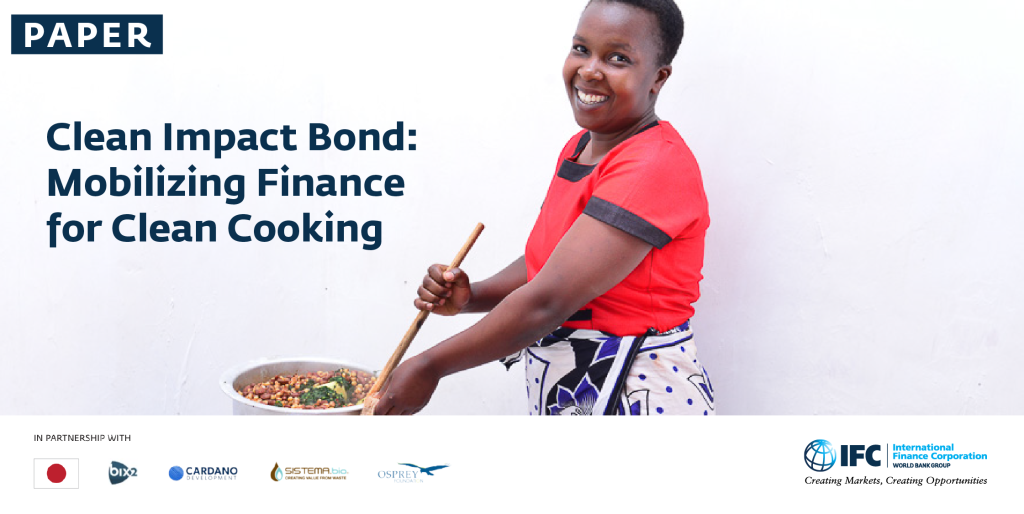- Date
- 25th May 2023
- Categories
- General

Research published today by the IFC shows how clean cooking devices can have a considerable positive impact on health and gender outcomes and create a valuable additional income stream for clean cooking companies. IFC’s learning brief Clean Impact Bond: Mobilizing Finance for Clean Cooking was launched at the workshop: Unlock Impact Finance for Clean Cooking – A Field Assessment of Clean Cooking Co-benefits for Climate, Health, and Gender at the Innovate4Climate conference on May 25. The brief highlights how the recently launched Clean Impact Bond, a results-based financing instrument, mobilized finance for SMEs based on the sales of certified health and gender credits similar to carbon credits in the clean cooking sector for the first time.
Cardano Development, IFC, and partners-including MECS- launched the Clean Impact Bond (CIB) in 2022. It is a development impact bond (DIB) designed to mobilize finance from a variety of partners to scale up the production of clean cooking solutions, by quantifying and selling the health and gender co-benefits to outcome buyers. A DIB was chosen as the model for the CIB because it allows partners to focus on the outcomes that clean cooking solutions can generate, rather than paying for the inputs or outputs. The report notes that the CIB-as a development impact bond, is also a type of Results Based Finance (RBF).
The Clean Impact Bond involves a collaboration between Cardano Development, IFC, BIX Capital, the Osprey Foundation, and Sistema.bio. BIX Capital, as the investor, provided upfront working capital financing in the amount of $300,000 to Sistema.bio, the cooking enterprise, which used the financing to scale up operations to reach low-income customers. Outcomes of the CIB aimed for an improvement in averted ill health and mortality, and an increase in Quality Time saved by women through the use of the biogas digesters, provided by Sistema.bio to rural families across 10 regions of Kenya. The Osprey Foundation, as the outcomes buyer, committed up to $500,000 to pay for health and gender outcomes after they had been independently verified and certified to have been achieved. MECS provided some financial support and technical advice to Cardano to facilitate its work in arranging the transaction.
The CIB used the averted DALY (aDALY) metric for measuring health impacts. This comprises the amount of healthy life saved due to the intervention (including time spent free of illness and avoided premature death). For Gender the CIB measured the additional Quality Time available for a woman to use for income generation, the production of goods that otherwise would be bought, education, rest, and/or leisure. The interventions are being certified by the Gold Standard and have pioneered the practical application of their methodologies in these areas.
Several lessons are highlighted by IFC from developing and structuring the CIB, and opportunities were identified for improving the design of future RBFs. The key lessons learned were the importance of establishing effective partnerships to structure the RBF; designing the RBF so that it reaches targeted underserved customers; and effectively assessing, validating, and certifying the outcomes.
Despite the increased focus on Sustainable Development Goal 7 (SDG7 – Affordable and Clean Energy), 2.4 billion people worldwide lack access to clean cooking. SDG 7 aims to achieve universal access to affordable, reliable, and modern energy services by 2030. The CIB is the first global initiative to monetize the gender and health co-benefits of clean cooking solutions, alongside the more commonly available carbon credits. As such it is an innovative financial instrument that offers new opportunities to channel funding into Modern Energy Cooking projects.
Professor Ed Brown, Research Director of the Modern Energy Cooking Services (MECS) programme, said, “This is a fantastic development. MECS has been exploring the potential role of impact finance in scaling modern energy cooking interventions for some time. It’s wonderful to see this partnership of innovative funders, project implementers and facilitators bring this new approach to fruition.”